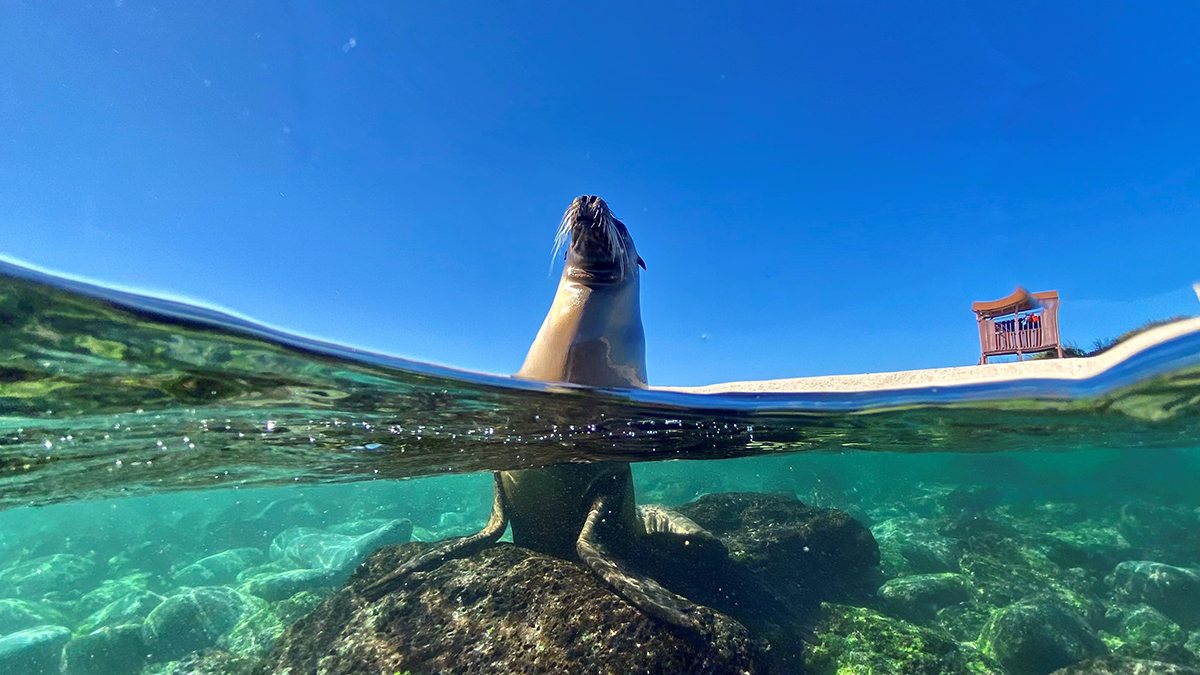$1.5 million gift launches Kenan Galapagos program this fall
The William R. Kenan, Jr. Charitable Trust-funded fellowships will support graduate students and post-docs.

“Conducting science in the Galapagos is, of course, the dream for any biologist,” said Esteban Agudo, who will graduate with a doctorate in marine ecology from Carolina in 2024. Agudo spent six months on San Cristobal Island working on his dissertation at the Galapagos Science Center, a research facility co-founded and co-operated by UNC-Chapel Hill and Universidad San Francisco de Quito in Ecuador.
Agudo described his stay at the center, the only university-affiliated research institution of its kind in the Galapagos archipelago, as an opportunity “to work in one of the most amazing natural laboratories in the world.”
Now more students like Agudo will have the opportunity to study and conduct research in the Galapagos, a place that serves as a model for understanding similarly challenged environments around the world. The William R. Kenan, Jr. Charitable Trust awarded $1.5 million to the UNC Center for Galapagos Studies to create the Kenan Galapagos Fellows Program, which will support three graduate students per year for three years and one post-doctoral fellow per year for two years. The first graduate fellowships will begin in fall 2024.
“This funding provides amazing opportunities for current and incoming graduate students and post-docs to conduct cutting-edge research, apply what they are learning in the classroom and lab to real-world problems, and impact communities locally, in the state and globally,” said Amanda Thompson, director of UNC Center for Galapagos Studies and co-director of GSC.
The grant also supports expanding research capacity in areas such as clean oceans, biodiversity, ecosystem and human health. This means more funding for Galapagos research expeditions, research equipment and infrastructure, and staff assistance to collect and disseminate critical climate data to researchers around the globe.
“For over a decade, the Galapagos Science Center has been a hub for exceptional scientists, conducting research that deepens our understanding of fragile ecosystems and communities and solutions needed to ensure their sustainability,” said Penny Gordon-Larsen, vice chancellor for research and the William R. Kenan, Jr. Distinguished Professor in nutrition at UNC-Chapel Hill. “This work in the Galapagos is directly translatable to the fragile ecosystems on the North Carolina coast and its barrier islands, and the support from the Kenan Charitable Trust will enable us to generate even more innovative solutions and amplify the positive impact for people and places, here and across the globe.”
Since the Galapagos Science Center was founded in 2011, faculty and students have conducted over 140 research projects and have been cited in over 300 research publications. More than 600 students have engaged with the region through study abroad, research and education programs, developing 150-plus undergraduate, master’s and doctoral theses from their studies. More than 8,000 Galapagos community members have participated in outreach programs.
“The grant from Kenan Charitable Trust will support the center’s equipment and infrastructure, which will allow us to host more researchers, develop better research and improve local livelihoods and ecosystem conservation,” said Carlos Mena, co-director of the Galapagos Science Center and geography professor at USFQ.
Currently, researchers at the GSC are conducting joint studies around food and water insecurity in the Galapagos; creating a biobank of samples from across the islands to help with preservation and provide new opportunities for studies; running marine expeditions to protect marine biodiversity and understand climate variables; and engaging in work to understand these islands and challenged ecosystems around the world.
The UNC Center for Galapagos Studies is accepting applications for fellowships starting in fall of 2024 through May 3. For more information about the Kenan Galapagos Fellows Program and current research underway at the GSC, visit galapagos.unc.edu.







